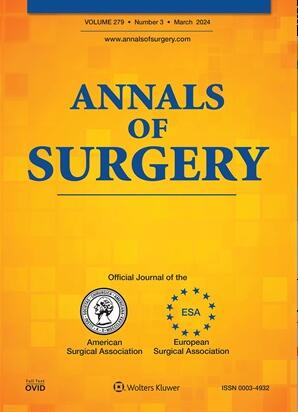社会脆弱性阻碍胃肠道肿瘤手术患者参与临床试验。
IF 6.4
1区 医学
Q1 SURGERY
引用次数: 0
摘要
目的探讨社区社会脆弱性对胃肠道(GI)肿瘤手术患者临床试验参与的影响。临床试验对癌症治疗至关重要,但往往排除弱势群体。方法:在Vizient临床数据库(CDB)中查询2018年7月至2023年6月期间接受手术切除的胃食管癌、胰腺癌和结直肠癌患者,该数据库包含98%的学术医疗中心、110多家肿瘤医院和700多家社区医院。采用由9个人口普查区域组成的Vizient脆弱性指数(VVI)来研究社会脆弱性与试验参与之间的关系。结果共纳入399,446例患者,其中7,680例(1.9%)参加了临床试验。临床试验参与者不太可能是社会弱势群体(OR 0.71, P<0.0001),特别是在经济和教育的VVI领域,并且在社区医院接受过切除术(OR 0.38, P<0.0001)。较高的社会脆弱性使在社区医院接受手术的患者比在学术/专业中心接受手术的患者更大程度地降低了入组的几率(OR 0.52 vs. 0.75;相互作用P<0.0001)。试验参与者较少为女性(OR 0.84, P<0.0001)、黑人(OR 0.69, P=0.0002)和拥有医疗补助保险(OR 0.81, P<0.0001)。结论在胃肠道肿瘤手术患者中,女性、黑人、医疗保险、社区社会脆弱性,特别是经济和教育脆弱性与临床试验入组几率较低有关。在社区医院进行手术是最抑制试验入组的因素,而这种影响又因社会脆弱性而加剧。本文章由计算机程序翻译,如有差异,请以英文原文为准。
Social Vulnerability Hinders Clinical Trial Participation in Gastrointestinal Cancer Surgery Patients.
OBJECTIVE
This study examines how neighborhood social vulnerability impacts clinical trial participation for gastrointestinal (GI) cancer surgery patients.
SUMMARY BACKGROUND DATA
Clinical trials are critical to cancer care but often exclude disadvantaged groups.
METHODS
The Vizient Clinical Database (CDB), which captures 98% of academic medical centers, 110+cancer hospitals and 700+community hospitals, was queried for gastroesophageal, pancreatic, and colorectal cancer patients who underwent surgical resection from July 2018-June 2023. The Vizient Vulnerability Index (VVI), comprised of 9 census tract-level domains, was used to study the association between social vulnerability and trial participation.
RESULTS
399,446 patients were identified, 7,680 (1.9%) of whom participated in a clinical trial. Clinical trial participants were less likely to be socially vulnerable (OR 0.71, P<0.0001), particularly in the VVI domains of economic and education, and to have undergone resection at a community hospital (OR 0.38, P<0.0001). High social vulnerability decreased the odds of enrollment for patients who underwent surgery at community hospitals by a greater degree than those who underwent surgery at academic/specialized centers (OR 0.52 vs. 0.75; P<0.0001 for interaction). Trial participants were less likely to be female (OR 0.84, P<0.0001), Black (OR 0.69, P=0.0002), and have Medicaid insurance (OR 0.81, P<0.0001).
CONCLUSIONS
Among gastrointestinal cancer surgery patients, female sex, Black race, Medicaid insurance, and neighborhood social vulnerability, particularly economic and education vulnerability, were associated with lower odds of clinical trial enrollment. The factor that most inhibited trial enrollment was surgery at a community hospital, and this influence was compounded by social vulnerability.
求助全文
通过发布文献求助,成功后即可免费获取论文全文。
去求助
来源期刊

Annals of surgery
医学-外科
CiteScore
14.40
自引率
4.40%
发文量
687
审稿时长
4 months
期刊介绍:
The Annals of Surgery is a renowned surgery journal, recognized globally for its extensive scholarly references. It serves as a valuable resource for the international medical community by disseminating knowledge regarding important developments in surgical science and practice. Surgeons regularly turn to the Annals of Surgery to stay updated on innovative practices and techniques. The journal also offers special editorial features such as "Advances in Surgical Technique," offering timely coverage of ongoing clinical issues. Additionally, the journal publishes monthly review articles that address the latest concerns in surgical practice.
 求助内容:
求助内容: 应助结果提醒方式:
应助结果提醒方式:


